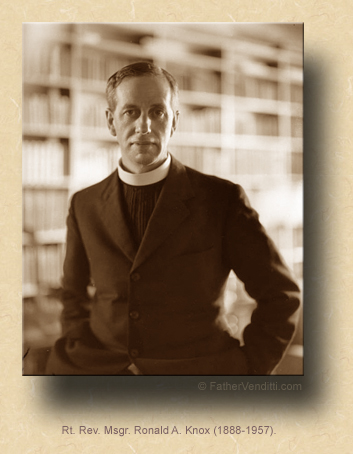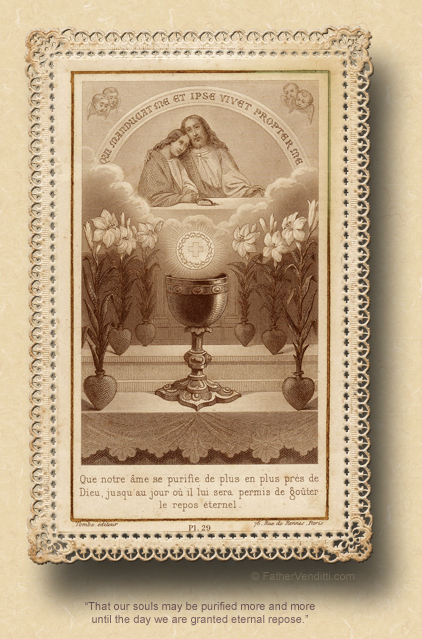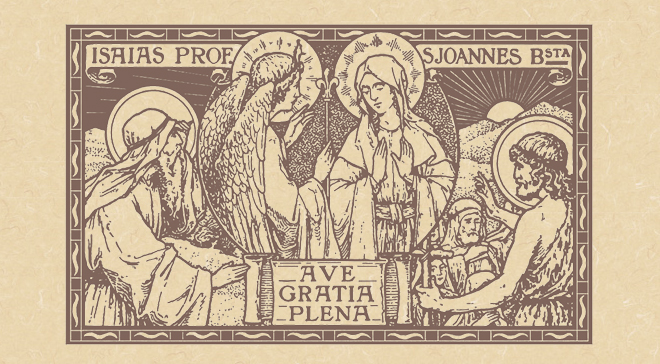Should You Ever Visit the Yale Club, Don't Mention My Name.
The First Sunday of Advent.
Lessons from the primary dominica, according to the ordinary form of the Roman Rite:
• Isaiah 2: 1-5.
• Psalm 122: 1-9.
• Romans 13: 11-14.
• Matthew 24: 37-44.
Lessons from the dominica, according to the extraordinary form of the Roman Rite:
• Romans 13: 11-14.
• Psalm 24: 3-4.
• Luke 21: 25-33.
FatherVenditti.com
|
 7:13 AM 12/1/2019 — Those of you who have attend Holy Mass with me may have noticed that whenever I quote the Holy Scriptures, nine times out of ten I quote from the Knox Bible, released in pieces at the beginning of the last century, but finally published in a single volume for the first time in 1954. It was a labor of love done by one man, Msgr. Ronald A. Knox, an English priest and convert to Catholicism who was—and probably remains—the greatest classical language scholar who ever lived. 7:13 AM 12/1/2019 — Those of you who have attend Holy Mass with me may have noticed that whenever I quote the Holy Scriptures, nine times out of ten I quote from the Knox Bible, released in pieces at the beginning of the last century, but finally published in a single volume for the first time in 1954. It was a labor of love done by one man, Msgr. Ronald A. Knox, an English priest and convert to Catholicism who was—and probably remains—the greatest classical language scholar who ever lived.
Among his many accomplishments—and, believe me, there are many—he was known as a very gifted preacher, and one of the first sermons of his I read was an Advent sermon he preached in 1947.
Everybody knows [says Msgr. Knox] what it is to plod on for miles, it seems, eagerly straining your eyes towards the lights that, somehow, mean home. How difficult it is, when you are doing that, to judge distances! In pitch darkness, it might be a couple of miles to your destination, it might be a few hundred yards. So it was, I think, with the Hebrew prophets, as they looked forward to the redemption of their people. They could not have told you, within a hundred years, within five hundred years, when it was the deliverance would come. They only knew that, some time, the stock of David would burgeon anew; some time, a key would be found to fit the door of their prison house; some time, the light that only showed, now, like a will-o'-the-wisp on the horizon would broaden out, at last, into the perfect day.*
I don't think anyone but Father Knox could have expressed so clearly, in just a few sentences, what Advent is really all about. We all think we know what Advent is: a preparation for Christmas; but, as Msgr. Knox so beautifully tells us, the Church's intention in Advent is to encourage in us a reproduction of the spirit of the Old Testament prophets calling forth repentance upon the people of Israel as they awaited the coming of the Savior. The readings for the Advent season rely heavily on the prophets, particularly the prophet Isaiah; even the Gospel lessons chosen frequently present to us those occasions—and there were many—wherein our Lord quotes from the prophets; and, if we take them as a whole, we realize that what most of us think Advent is about isn't really what it's about. Recall the Collect that the priest prayed at the beginning of Mass today: “Grant to your faithful, we pray, almighty God, the resolve to run forth to meet your Christ with righteous deeds at his coming, so that, gathered at his right hand, they may be worthy to possess the heavenly Kingdom.”  There's no mention of Christmas there; the Advent we await is not the coming of the Baby Jesus in the Manger; the Advent we await is the coming of Christ the King and Judge of the world. In other words, it's the not the first coming of Christ for which the season is preparing us; it's His second. In fact, up until the sixth century, when Pope Saint Gregory introduced this season, which had been observed locally in various place, to the whole Church, it was typically called the “Christmas Lent,” even though Christmas was not its focus. From the beginning, it was meant clearly as a penitential season: no Gloria is sung at the Sunday Mass, and the priest wears the color of Lent. There's no mention of Christmas there; the Advent we await is not the coming of the Baby Jesus in the Manger; the Advent we await is the coming of Christ the King and Judge of the world. In other words, it's the not the first coming of Christ for which the season is preparing us; it's His second. In fact, up until the sixth century, when Pope Saint Gregory introduced this season, which had been observed locally in various place, to the whole Church, it was typically called the “Christmas Lent,” even though Christmas was not its focus. From the beginning, it was meant clearly as a penitential season: no Gloria is sung at the Sunday Mass, and the priest wears the color of Lent.
The irony of this season is that, while it precedes Christmas and does serve—at least toward the end—as a preparation for celebrating our Blessed Lord’s birth, most of it is asking us to contemplate not birth but death, and the need to be always prepared for it. “You know the time,” says Saint Paul to us today; “it is the hour now for you to awake from sleep” (Rom. 13: 11 RM3). And in the very first Gospel lesson given to us to hear on the first day of the Year of Grace, our Lord admonishes us to consider our final judgment. It’s actually a response our Lord gave a few verses before where today’s lesson begins, in which the Pharisees ask Him when the Kingdom of God will come. He answers their question, or so they think because, in reality, they’ve asked Him one question but He answers another.
Some years ago a priest friend of mine invited me to “lunch with him”—which is how they say it—at the Yale Club in New York, of which he was a member having graduated from that famous institution of higher learning; and, as we were sitting in the lounge sipping exotic beverages which I couldn't possibly pronounce, a rather distinguished looking gentleman walked up, recognizing us as priests, and started going on about how much he admired Pope John Paul II, who was pope at the time, even though he himself was not what he called a “religionist,” and how a practical atheist like him could still find much merit in what this particular Pope had done for Western Civilization. And without any regard for where I was, I replied, much to the shock of my companion, that he couldn't have admired him that much if he couldn't bring himself to investigate further the faith for which he stood and lived his life. I haven't been invited back to the Yale Club since.
But our Lord does exactly this very same thing. The question they asked Him in the verses leading up to today’s Gospel was simple, abstract and safe: when is the Kingdom of God going to come?  He responds, in today's lesson, by recalling Noah’s Ark, and how everyone but Noah and his family got washed away without any warning; then, He dazzles them with these bizarre metaphors: two people in one bed, one being taken and the other left; two women grinding corn together, one taken the other left. In other words, what their asking Him about is a theological concept; what He's telling them about is themselves. They want to know about the final judgment; what he's telling them about is the particular judgment. They want to know what's going to happen when the world comes to an end; He’s saying to them, Don't waste your time musing over when the world is going to come to an end; worry instead about what's going to happen when you come to an end, and that can happen at any time. The lesson He’s giving to us is simplicity itself: the Christian needs to live every minute of his life conscious of the fact that life is short, that it can be required of us by God at any time, and that we should always keep our souls prepared by suppressing our vices, seeking the Lord’s constant grace in confession when we sin, and by steeling ourselves against temptation by staying ever close to our Blessed Lord through frequent and worthy Holy Communion. Given the prospect of final judgment, that’s just common sense; but, you know what they say about common sense: that it isn’t always so common, especially when we are so easily distracted by the concerns of daily life. He responds, in today's lesson, by recalling Noah’s Ark, and how everyone but Noah and his family got washed away without any warning; then, He dazzles them with these bizarre metaphors: two people in one bed, one being taken and the other left; two women grinding corn together, one taken the other left. In other words, what their asking Him about is a theological concept; what He's telling them about is themselves. They want to know about the final judgment; what he's telling them about is the particular judgment. They want to know what's going to happen when the world comes to an end; He’s saying to them, Don't waste your time musing over when the world is going to come to an end; worry instead about what's going to happen when you come to an end, and that can happen at any time. The lesson He’s giving to us is simplicity itself: the Christian needs to live every minute of his life conscious of the fact that life is short, that it can be required of us by God at any time, and that we should always keep our souls prepared by suppressing our vices, seeking the Lord’s constant grace in confession when we sin, and by steeling ourselves against temptation by staying ever close to our Blessed Lord through frequent and worthy Holy Communion. Given the prospect of final judgment, that’s just common sense; but, you know what they say about common sense: that it isn’t always so common, especially when we are so easily distracted by the concerns of daily life.
Be sure of this [says our Lord today]; if the master of the house had known at what time of night the thief was coming, he would have kept watch, and not allowed his house to be broken open. And you too must stand ready; the Son of Man will come at an hour when you are not expecting him (Matt. 24: 43-44 Knox).

* R. A. Knox, Sermon on Advent, December 21, 1947.
|

